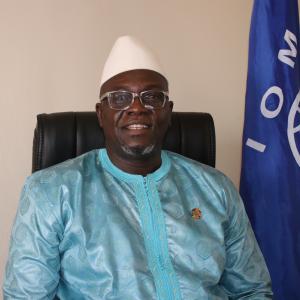Remarks at Launch of IOM Uganda Country Strategy 2024-2028
The remarks were delivered by the Acting UN Resident Coordinator, IOM Chief of Mission, Mr. Sanusi Savage
The Prime Minister of Uganda, Right Honourable Robinah Nabbanja
Hon Ministers, Members of Parliament, and Permanent Secretaries Present.
Your Excellencies, Ambassadors present
The IOM Regional Director for East, Horn and Southern Africa, Mr. Frantz Celestin
UN Country Team Colleagues here today
Representatives of Government Ministries, Departments and Agencies,
I stand before you on behalf of the UN Resident Coordinator in Uganda, Ms. Susan Ngongi-Namondo, who is currently outside the country. It gives me great pleasure to make these remarks, as the International Organization for Migration (IOM) launches its new four-year Country strategy.
On behalf of the United Nations in Uganda, I would like to congratulate IOM for reaching this milestone. It is now eight years since IOM formally joined the United Nations and became the UN Migration Agency. And among the reasons for this development was the rising prominence and complexity of migration challenges, as well as the realization that the UN needed a dedicated agency and coordinated response.
Eight years later, We all know now that the reasons for which IOM joined the UN remain as valid, or even more pertinent than they were before 2016. I am pleased to note that IOM’s Country Strategy is aligned to the UN Global agenda including the 2030 Agenda for Sustainable Development; Our Common Agenda, which presents the Secretary-General's vision on the future of global cooperation through an inclusive, networked, and effective multilateralism; and the Pact of the Future endorsed by the UN General Assembly last month. The Pact for Future covers a broad range of themes including peace and security, sustainable development, climate change, digital cooperation, human rights, gender, youth and future generations, and the transformation of global governance. Each of IOM’s programme is linked to one or more SDGs, which positions it well to contribute effectively to Uganda’s broader development agenda.
Whether you talk about the thousands of young Ugandans who flock abroad for work each year; you talk about young people desperate to get to the West and escape poverty; talk about vulnerability of migrants – to abuse, trafficking and other vices – the importance of IOM has never been clearer.
Right Honourable Prime Minister, Ladies and Gentlemen
Across the world, the UN has strategic relationship with the Governments and peoples of the respective countries. That relationship has evolved over the years and continues to evolve. Some of us here might remember the UN Development Assistance Plan in the 1990s, which was replaced by UNDAF (the UN Development Assistance Framework) in early 2000s. Today we are talking about the UN Sustainable Development Cooperation Framework (UNSDCF).
In Uganda, IOM is an integral to that cooperation between the UN and the Government and people of Uganda. And I am delighted that the IOM strategy being launched today underlines cooperation, collaboration and co-creation of interventions for sustainable development.
This is crucial because by its nature, migration is a cross-cutting issue. No country, agency, Government or MDA can address all the migration-related challenges on its own. It is, therefore, instructive that IOM is undertaking to leverage partnerships and collaboration. We hope that all of you stakeholders here today will embrace that collaborative spirit for the good of this beautiful country.
Within the United Nations, IOM serves a crucial convening role as co-chair of the UN Network on Migration, with several agencies regularly addressing popular issues. I have no doubt that the network will increase collaboration and cooperation.
The second message I want us to reflect on is that migration should not be seen as a problem that has to be solved. Rather, migration is a reality that needs to be harnessed for better outcomes – both for migrants and host communities. We all know that when resources are scarce, people often scramble and see enemies where there are none.
It does not have to be like that. Indeed, for years, Uganda has been a model and shining light for how to receive and support foreigners – be they refugees or migrants. All stakeholders need to pull together to maintain that reputation.
The timing of this strategy launch is tricky because the Government is finalizing the NDP IV and the UN together with the Government are preparing the next UN Sustainable Development Cooperation Framework 2026- 2030. But I am sure once the new Cooperation Framework is completed, IOM will not lose the first opportunity to tweak and ensure alignment with the new national priorities. In addition, the midterm review of the IOM Uganda Country Strategy should be used as an opportunity to revise the strategy to fully align with the Cooperation Framework.
As I conclude, I would like to, once again, urge all stakeholders, especially the donors, to support IOM and the Government to deliver this strategy.
To IOM colleagues, I am sure you agree that making such a coherent strategy has been far from easy. Yet I have no doubt that what you have achieved is the easier bit. The harder work is just beginning – and that is implementing the strategy. Still, with enhanced cooperation, collaboration and coordination with critical stakeholders, there is no reason why this strategy should not succeed.
Thank you for your attention.
Speech by








